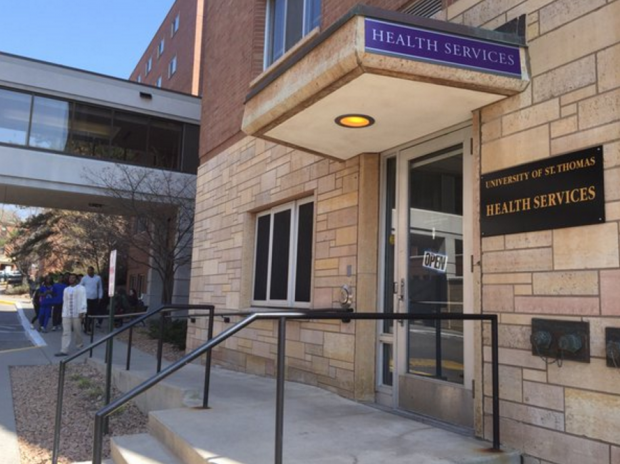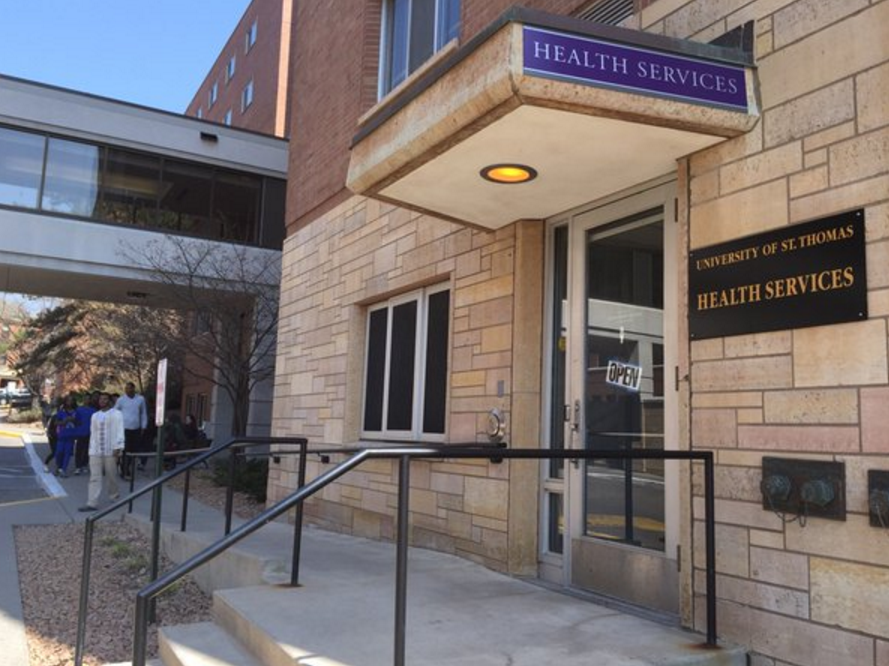
More than 20 residents of the University of Minnesota’s Frontier Hall became ill with norovirus early last week, causing some students to stay away from the residence hall.
Boynton Health Service Director of Public Health and Communications at the University of Minnesota, David Golden confirmed the illness to be norovirus.
“Although we will not ever know how many students were actually infected, our best guess is about 30 that had called in to us with symptoms,” Golden said.
According to a Minnesota Department of Health fact sheet, the norovirus is actually a group of viruses that cause inflammation of the stomach and intestines. It can be confused with the stomach flu but is not related to the flu virus, which is a respiratory illness.
“The (norovirus) illness is really an acute onset of nausea, vomiting and diarrhea … very different than influenza, which is coughing, sore throat, fevers, chills,” St. Thomas Executive Director of Health Wellness and Counseling Madonna McDermott said.
The virus is highly contagious and is found in the feces or vomit of infected people. From there, it is transferred to food, water or surfaces by the hands of those infected, according the the fact sheet.
During the outbreak, some students elected to stay away from Frontier Hall and took other precautions to avoid the illness.
“I have a group of friends who live in Frontier Hall, five of which who have (or) had norovirus,” University of Minnesota first-year Samantha Oberstar said. “Once I heard about the sickness, I stayed away from Frontier Hall and a lot of my friends, as they all lived in the same hallway. I also used a lot of hand sanitizer and washed my hands frequently.”
Many St. Thomas students frequent the University of Minnesota, such as first-year Alice Ready, who has friends there.
“Last week I visited my friend in Pioneer Hall,” Ready said. “If (the virus) spreads I will definitely not meet her in the halls and maybe meet up somewhere else.”
University of Minnesota first-year Eric Elert was part of the group in Frontier Hall who caught the virus. Elert described it as “the worst illness I have encountered in five or so years.”
“I first expressed symptoms on Wednesday morning. I had an unsettled stomach and diarrhea. I started throwing up closer to noon,” said Elert, who soon after called his father, a physician for information on what to do.
Elert never received a final diagnosis, but believes he likely had norovirus.
“My recovery lasted two days. I missed all classes Wednesday through Friday,” Elert said “I was extremely dehydrated, so I needed to be able to keep down some fluids. I took nausea medication in order to retain more fluid.”
The illness typically comes on suddenly with symptoms including vomiting, diarrhea and stomach cramping. Other less-common symptoms can include a low-grade fever or chills, headache and muscle aches. According to the fact sheet, symptoms usually begin one or two days after ingesting the virus, but may appear as early as 12 hours after exposure.
According to the fact sheet, those who display symptoms should “drink plenty of fluids so you don’t become dehydrated. Wash your hands often and do not prepare food for others. Contact your health care provider (but remember that antibiotics don’t treat viruses).”
Elert, however, was not suffering alone.
“One of my friends who lives on the second floor above me currently is sick,” Elert said. “Also, one of my neighbors across the hall was sick at the same time I was.”
The university took precautions during the worst days of the outbreak.
“The housing staff disinfected both the stairwells and the bathrooms a few times a day during the worst days of the virus,” Elert said. “There were multiple emails about the virus, as well as information on how to prevent it from spreading.”
“Currently, all of the SuperBlock or Centennial, Territorial, Pioneer and Frontier Halls have been disinfected,” Golden said.
The university also sent out a notification email to the students in those halls, as well as one to Frontier Hall residents. Oberstar felt the notifications came too late, however.
“The virus had spread to many people already,” she said. “It was also on the news days before we were notified by the school.”
Golden does not plan to send any more email about the virus.
“We are not seeing a sharp rise in cases, so I do not think there will be a need for more communications,” he said.
The outbreak has also alarmed St. Thomas students, such as first-year Sara Huettner.
“I have heard a lot about it (norovirus), especially from friends. They are really afraid if you get sick, ‘Oh my God, you might have the norovirus,’” Huettner said. “It has only affected a handful of people, but it’s definitely scaring everybody, that’s for sure.”
In order to prevent, the Minnesota Department of Health recommends washing hands with warm soapy water for 20 seconds after using the bathroom, after changing diapers, before preparing foods and before eating. It also recommends cleaning and disinfecting surfaces with a household bleach solution immediately after vomiting or diarrheal accidents.
Elert seconded those recommendations and said his friends kept their distance while he was sick.
“I also encountered a lot of people who were so deathly afraid of getting sick that they didn’t come anywhere near the residence hall,” Elert said. “I encountered a few people who wouldn’t even talk to me because I had been sick a few days prior. Try to be understanding of friends and know that they would not be purposefully spreading the illness.”
McDermott said St. Thomas has seen just a few cases of the virus, and that students should make sure to wash their hands, avoid class if they are sick and clean door handles.
McDermott also recommended carrying around little bottles of hand sanitizer.
“We do want to try and get the word out to get to students to make sure they are paying attention to this because it can have a huge impact on a closed environment,” she said.
Emily Sweeney can be reached at swee4225@stthomas.edu.



